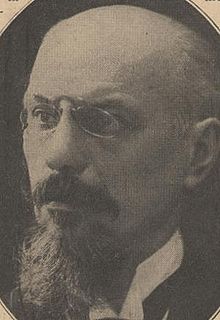Émile Fabre (24 March 1869 in Metz, France – 25 September 1955 in Paris) was a French playwright and general administrator of the Comédie-Française from 1915 to
| Émile Fabre | |
|---|---|
 Émile Fabre in 1917 Émile Fabre in 1917 | |
| Born | 24 March 1869 Metz, France |
| Died | 25 September 1955 Paris, France |
1936. He was greatly influenced by Balzac as a young man, and most of his best-known plays deal with the sacrifice of personal happiness to the pursuit of wealth. He also wrote the libretto for Xavier Leroux's opera Les cadeaux de Noël (The Christmas Gifts) which was a great success when it premiered in Paris in 1915.
Career at the Comédie-Française
Fabre was appointed general administrator of the Comédie-Française on 2 December 1915. According to Susan McCready,
During Fabre's tenure, the Comédie-Française moved from the center of the theatre scene, where theatrical creation and innovation are paramount, to its periphery, where its role was increasingly limited to the preservation of the past.
In 1922 he organised the Cycle Moliere, in which all of Moliere's plays were performed in chronological order.
The success of this event, encouraged him to organise the Centennial of Romanticism in 1927, the 100-year anniversary of Victor Hugo's Preface de Cromwell (Qe Waleffe). Over the course of the Centennial the theatre staged twenty-one Romantic plays.
He resigned from the position 15 October 1936.
Plays
Fabre's plays include:
- L'Argent (Money), 1895
- La Vie publique (Public Life), 1901
- Les Ventres dorés (Gilded Stomachs), 1905
- Les Sauterelles (The Locusts), 1911
References
- "Émile Fabre | French dramatist | Britannica". Encyclopædia Britannica. Retrieved 11 December 2021.
- ^ McCready, Susan (2003). "The Compromise of Commemoration: The 1927 Centennial of Romanticism at the Comédie-Française". Modern Drama. 46 (2): 227–240. doi:10.1353/mdr.2003.0058. ISSN 1712-5286. S2CID 201757099.
- ^ Garreau, Joseph E. (1984). "Fabre, Émile" in Stanley Hochman (ed.) McGraw-Hill Encyclopedia of World Drama, Vol. 1, p. 136. ISBN 0070791694
- Le Figaro (13 April 1917). "Courrier des Théâtres", p. 4 (in French)
This article about a French dramatist or playwright is a stub. You can help Misplaced Pages by expanding it. |
This article about a French writer or poet is a stub. You can help Misplaced Pages by expanding it. |